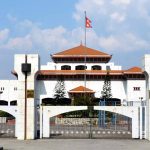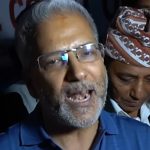
The Nepali Congress and CPN-UML, coalition partners, are nearing the completion of the process of establishing processes to determine the areas for constitutional amendments, five months after creating the government under KP Sharma Oli.
When the Congress and the UML formed the government in mid-July, they made a significant commitment to alter the constitution and review clauses that have made its implementation challenging.
Bilateral negotiations between the Congress and the UML on the constitution amendment process finally began on Tuesday. At its Tuesday meeting, an eight-member task team that was established to improve ties between the two parties talked about starting the amendment process.
“The amendment issue has finally come up for consideration as of today [Tuesday],” a task group member stated. “We are now debating how to move forward and begin more extensive conversations and engagements. To do the necessary homework, we are thinking of creating a task force that is either political or non-political.
A senior politician will serve as the head of the cross-party task team, which will include representatives from several political parties. A former chief justice of the Supreme Court or any other esteemed legal person who is acceptable to all parties involved will lead any non-political task force that is established.
According to a task force member, several members of Congress and UML leaders have proposed creating a non-political structure or task force where legal experts, constitutional experts, human rights advocates, and others may be accommodated and a path forward can be determined based on their recommendations. “If we establish a political mechanism, we will face challenging issues,” he stated.
During the three-hour meeting, the leaders also talked about various “neutral” people who could be able to head such a task force or mechanism.
Discussions and talks over the topics that must be addressed in order to modify the constitution have already begun among some opposition political parties.
The national consensus government led by Oli would prioritize amending the constitution and creating laws that guarantee political stability by assessing the constitution’s strengths and weaknesses and the difficulties encountered in its implementation, according to point number two of the seven-point agreement signed in July between the Congress and UML.
Home Minister Ramesh Lekhak stated, “According to the agreement, our party will shortly establish a mechanism to identify the content for amendment.”
At a gathering in Kathmandu, Lekhak announced that the UML and the Nepali Congress would soon establish independent task committees to determine what should be changed in the constitution. “The government has also taken action in this regard.”
“The modification process takes time to complete. It will take place following a number of talks and considerations between the parties. All political parties will gather and draft amendments when we evaluate our ten years of constitutional practice,” he stated.
“We will start conversations, analyze and appraise the state of the constitution’s implementation, determine the topics for amendments, and continue with discussions and deliberations,” Lekhak stated.
Discussions both inside and outside of political circles have been sparked by the two major parties’ agreement to change the constitution. There is disagreement among the parties on whether it is appropriate to amend the constitution at this time.
However, Home Minister Lekhak stated that the opposition and ruling parties will first examine the constitution’s ten-year history and determine its advantages and disadvantages. In the second step, the opposition and ruling parties will meet together to determine which subjects require amendment. Finally, the Congress and UML will agree on the amendment’s content and present it to the parliament.
Additionally, he explained that the constitutional amendment will make inclusivity stronger rather than weaker.
The CPN (Maoist Center), the third-largest party, will shortly make its stance on constitutional amendment public as well. Discussions on the issue will begin during the party’s next central committee meeting, which is set to begin on January 5, according to party spokesperson Agni Prasad Sapkota.
“Although the party has its own stance on the proposal, we are amenable to negotiations,” Sapkota stated. Only after the central committee meeting will the party publicly announce its stance.
Our stance is unambiguous: any constitutional modification must serve a progressive rather than a regressive purpose. Prosperity and development ought to be its goals. Second, for political stability, the president needs to be chosen directly. In both houses of parliament, we must choose complete inclusivity. “The long-term political instability in the nation will end if we ensure these issues in the new amendment proposal,” Sapkota stated.
In addition to the Maoist Center, other parliamentaryly represented political parties are also researching constitutional reform, but they have not yet made their positions, plans, or research public.
On December 17, the CPN (Unified Socialist), a different party, established a seven-member task team led by Prakash Jwala to determine the party’s stance on the process of amending the constitution. “A task force has been established to provide recommendations in this area,” stated Jagannath Khatiwada, the party spokesperson.
Speaking at a party event in Kathmandu on Sunday, Congress General Secretary Gagan Thapa added that a system to modify the constitution would be established in a few days. Thapa went on to say that the process would be practical and that changes would be implemented gradually.
“The constitutional amendment debate has started,” Thapa declared. “The Congress and the UML will establish a mechanism in a few days. Since there isn’t any space for adventures, we shall approach this carefully. We will converse with other political parties as well.
According to him, the UML and Congress cannot simply seek to change the constitution. Only after extensive consultations with Madhesi, Maoists, and other political parties would it be carried out.
“Once we have reached a consensus with all parties and stakeholders, we will change the minimal provisions necessary to guarantee the smooth operation of the constitution,” Thapa stated.










